
JOURNAL OF CLINICAL IMMUNOLOGY
Scope & Guideline
Shaping the Future of Immune Disease Management
Introduction
Aims and Scopes
- Inborn Errors of Immunity (IEI):
The journal extensively covers research on genetic and phenotypic aspects of inborn errors of immunity, including their clinical presentations, treatment options, and long-term outcomes. - Autoimmunity and Immune Dysregulation:
Research articles focusing on autoimmune diseases, the mechanisms underlying autoimmunity, and the impact of immune dysregulation on patient health are predominant, highlighting both clinical and molecular insights. - Transplantation and Immune Reconstitution:
Studies related to hematopoietic stem cell transplantation (HSCT) and its effects on immune reconstitution in patients with various immunodeficiencies are a key focus area, including novel conditioning regimens and post-transplant care. - Immunotherapy and Novel Treatments:
The journal features articles on innovative therapeutic approaches, including immunotherapy, monoclonal antibodies, and gene therapy, aimed at managing immune disorders. - Clinical Research and Patient Outcomes:
There is a strong emphasis on clinical studies that evaluate patient outcomes, quality of life, and health care utilization among those with immunological disorders.
Trending and Emerging
- Genetic Insights into Immunodeficiencies:
There is a notable increase in research focused on the genetic basis of immunodeficiencies, with a growing emphasis on identifying novel mutations and understanding their clinical implications. - Impact of COVID-19 on Immunocompromised Patients:
The journal has seen a surge in studies investigating the effects of COVID-19 on patients with inborn errors of immunity, including vaccine responses and management strategies during the pandemic. - Machine Learning and Data-Driven Approaches:
Emerging trends include the application of machine learning and data mining techniques to predict outcomes in immunodeficiency patients, enhancing diagnostic accuracy and treatment personalization. - Longitudinal Studies on Immune Dysregulation:
There is an increasing focus on longitudinal studies that assess the long-term effects of immune dysregulation and its management, particularly in chronic conditions such as common variable immunodeficiency. - Personalized and Targeted Therapies:
The journal is increasingly publishing research on personalized treatment approaches, including targeted therapies and novel immunomodulatory treatments that aim to optimize patient outcomes.
Declining or Waning
- Traditional Immunodeficiency Diagnostics:
The focus on conventional diagnostic approaches for immunodeficiencies, such as serum immunoglobulin levels, is decreasing as more advanced genetic and molecular diagnostics gain traction. - General Case Reports:
There appears to be a waning interest in publishing general case reports without significant novel insights or broader implications for clinical practice, shifting towards more comprehensive studies. - Basic Immunology Studies:
Research that primarily explores basic immunological principles without direct clinical applications or implications for patient care is less frequently published, as the journal increasingly prioritizes clinically relevant findings.
Similar Journals
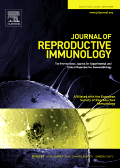
JOURNAL OF REPRODUCTIVE IMMUNOLOGY
Exploring the synergy of immunity and reproduction.The JOURNAL OF REPRODUCTIVE IMMUNOLOGY, published by Elsevier Ireland Ltd, stands as a pivotal platform for exploring the intricate interactions between reproductive health and the immune system. With an ISSN of 0165-0378 and an E-ISSN of 1872-7603, this esteemed journal spans over four decades, from 1979 to 2024, contributing significantly to the fields of Immunology, Reproductive Medicine, and Obstetrics and Gynecology. Currently ranked in Q2 for Immunology and Allergy and Q1 for both Obstetrics and Gynecology and Reproductive Medicine, it serves as an invaluable resource for researchers, professionals, and students dedicated to advancing knowledge in reproductive health. The journal’s notable impact factor and rigorous peer-review process underscore its commitment to high-quality research, making it an essential reference point for ongoing studies in this ever-evolving discipline. By promoting interdisciplinary discussions and pioneering research findings, the JOURNAL OF REPRODUCTIVE IMMUNOLOGY fosters a deeper understanding of the immune mechanisms that influence reproductive outcomes.
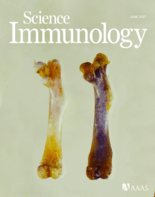
Science Immunology
Championing Open Access to Immunological BreakthroughsScience Immunology, published by the American Association for the Advancement of Science, is a leading journal in the field of immunology, recognized for its significant impact and rigor in advancing our understanding of immune responses and complex diseases. With an impressive impact factor that places it in the Q1 category of both immunology and allergy, as well as miscellaneous medicine, this journal is ranked #7 and #8 in their respective Scopus categories, reflecting its high-quality research output. Since its inception in 2016, Science Immunology has been at the forefront of interdisciplinary immunological research, fostering crucial insights that link immunology with pressing health challenges. The journal is committed to providing open access to its content, ensuring that groundbreaking findings are accessible to a global audience of researchers, professionals, and students. Its anthology not only addresses fundamental immunological mechanisms but also enhances the dialogue on translational applications and therapeutic interventions, solidifying its position as an essential resource within the scientific community.

Immunity Inflammation and Disease
Championing open science in the study of immune mechanisms.Immunity, Inflammation and Disease is a premier open-access journal published by WILEY, dedicated to advancing the field of immunology and allergy. Launched in 2013, this journal has established itself as a significant platform for researchers and professionals to disseminate high-quality research findings and innovative insights that address critical issues in immune responses and inflammatory diseases. With an impact factor that reflects its growing influence and a current ranking in Q3 for Immunology and Q2 for Immunology and Allergy, this journal serves a diverse audience keen on exploring cutting-edge developments. Researchers are encouraged to submit their work to share their findings with a global reach, foster collaboration, and enhance the understanding of immune mechanisms and therapeutic strategies. Accessible since its inception, Immunity, Inflammation and Disease is committed to open science, ensuring that vital research is freely available for the advancement of knowledge within the academic community and beyond.

Immunopathologia Persa
Disseminating Cutting-Edge Research for AllImmunopathologia Persa, published by NIKAN RESEARCH INST, is a premier open-access journal specializing in the fields of immunology, hematology, and endocrinology. Since its inception in 2015, the journal has aimed to disseminate high-quality research and innovative insights critical to understanding immune responses, disease mechanisms, and therapeutic strategies. Based in Iran, the journal contributes significantly to the academic landscape, with quarterly categorizations placing it in the fourth quartile across multiple vital sectors including Endocrinology, Diabetes and Metabolism, and Immunology. It features a diverse range of articles and studies that cater to both emerging and established researchers, aiding in the advancement of knowledge and clinical practice in immunopathology. With its commitment to open access, Immunopathologia Persa ensures that cutting-edge research is readily available to all, fostering a collaborative research environment and promoting the dissemination of findings globally. Researchers, professionals, and students are encouraged to explore the contents of this journal to stay abreast of the latest developments in these critical areas of health science.
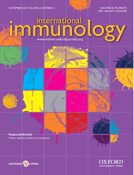
INTERNATIONAL IMMUNOLOGY
Unveiling Innovations in Immunology for Global Impact.INTERNATIONAL IMMUNOLOGY, published by OXFORD UNIV PRESS, stands out as a premier journal in the field of immunology, providing a vital platform for disseminating groundbreaking research and innovative developments within the discipline. With an impressive Q1 ranking in Immunology and Allergy, as well as in Medicine (miscellaneous), it consistently showcases high-impact studies that contribute to the advancement of immunological knowledge. The journal spans over three decades, from its inception in 1989 to its ongoing contributions as of 2024, thus solidifying its reputation in the scientific community. Researchers, professionals, and students will find valuable articles that delve into the complexities of immune responses, therapeutic interventions, and emerging immunological paradigms, ensuring INTERNATIONAL IMMUNOLOGY remains at the forefront of knowledge in the life sciences.

HUMAN IMMUNOLOGY
Elevating Understanding of Immune MechanismsHUMAN IMMUNOLOGY, published by Elsevier Science Inc, serves as a critical platform for disseminating research in the fields of immunology and allergy, as well as various aspects of miscellaneous medicine since its inception in 1980. With an ISSN of 0198-8859 and E-ISSN 1879-1166, this journal is pivotal for researchers and practitioners looking to advance their understanding of human immune responses and related conditions. The journal currently holds a respectable position within its field, as highlighted by its 2023 Scopus ranks—#114/233 in Immunology and Allergy and #132/236 in Immunology and Microbiology. Moreover, it maintains a Q2 quartile ranking in both Immunology and Allergy and miscellaneous Medicine, underscoring its influence and reach within the scientific community. Although it does not currently offer Open Access options, HUMAN IMMUNOLOGY remains dedicated to providing valuable insights and fostering academic discourse within its discipline, characterized by a rigorous peer-review process and a focus on innovative research trajectories.
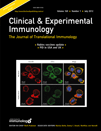
CLINICAL AND EXPERIMENTAL IMMUNOLOGY
Elevating Immunology: Where Research Meets Real-World ImpactClinical and Experimental Immunology, published by Oxford University Press, is a premier journal that has been a cornerstone in the field of immunology since its inception in 1966. With an ISSN of 0009-9104 and an E-ISSN of 1365-2249, this journal holds a significant position in academic research, currently ranking in the Q2 category for both Immunology and Allergy (2023). Its impactful contributions are reflected in its Scopus rankings, where it stands at Rank #63 out of 233 in Immunology and Allergy, placing it in the 73rd percentile, and Rank #73 out of 236 in Immunology and Microbiology. Researchers, healthcare professionals, and students will find this journal an invaluable resource for cutting-edge studies, reviews, and clinical advancements in the ever-evolving domain of immunology. While the publication does not offer open-access options, it remains a pivotal platform for disseminating knowledge that impacts both clinical practice and experimental research.
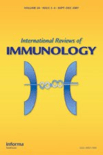
INTERNATIONAL REVIEWS OF IMMUNOLOGY
Transforming Research into Clinical ApplicationsINTERNATIONAL REVIEWS OF IMMUNOLOGY, published by Taylor & Francis Inc, is a leading academic journal that has been a cornerstone of immunological research since its inception in 1986. With an impressive impact factor and ranked in the top quartiles of its field (Q2 in both Immunology and Allergy), this journal offers a critical platform for the dissemination of influential findings and advancements within immunology. Spanning a diverse array of topics, from basic immune mechanisms to clinical applications, it aims to support the global scientific community in enhancing immunological understanding and therapeutic interventions. Researchers and professionals alike benefit from insights provided by renowned contributors, ensuring that the journal remains relevant in a rapidly evolving field. Directly accessible through subscription or institutional access, INTERNATIONAL REVIEWS OF IMMUNOLOGY is committed to fostering collaboration and innovation, making it an essential resource for anyone involved in immunological research and practice.
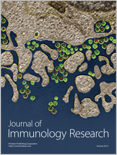
Journal of Immunology Research
Innovating Immunological Science: Bridging Knowledge GloballyJournal of Immunology Research, published by HINDAWI LTD, stands as a pivotal open-access journal in the realm of immunology, with a particular emphasis on advancing knowledge in both fundamental and applied aspects of the field. Since its inception in 1990, the journal has committed to the dissemination of high-quality research, earning a respectable impact factor that reflects its significance. Based in Egypt, it provides a platform for researchers from around the world, showcasing innovative studies and reviews that contribute to the understanding of immune system mechanisms. Its 2023 rankings place it in the Q2 category for Immunology and Allergy, and Q1 in the broader category of Medicine (miscellaneous), indicating a strong reputation among its peers. Through its open-access model, the journal promotes wide accessibility of cutting-edge research, catering to researchers, professionals, and students alike. With ambitions that converge through 2024, the Journal of Immunology Research continues to be an essential resource for those seeking to explore the forefront of immunological science.
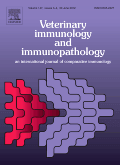
VETERINARY IMMUNOLOGY AND IMMUNOPATHOLOGY
Leading the way in veterinary immunology and therapeutic advancements.Veterinary Immunology and Immunopathology is a premier journal published by Elsevier, dedicated to advancing the field of veterinary science through rigorous investigations into the immunological mechanisms that underpin disease resistance, pathogenesis, and therapeutic interventions in animals. With an established history since 1979, this journal has consistently provided a platform for high-quality research, bridging the gap between immunology and veterinary medicine. The current impact factor reflects its significance within the field, particularly noted for its Q3 ranking in Immunology and Q2 in miscellaneous Veterinary categories as of 2023. The journal caters to a diverse audience, from seasoned researchers to students, by publishing original research, reviews, and case studies that explore pivotal topics such as vaccine development, immune response in various species, and the role of genetics in immunological disorders. Notably, it is indexed in Scopus, where it ranks in the top percentile of veterinary science disciplines, enhancing its visibility and impact within the scientific community. For those seeking to stay at the forefront of veterinary immunology, this journal is an invaluable resource.